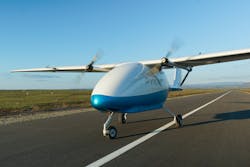Pyka delivers first large-scale autonomous electric cargo aircraft to AFWERX
NEW BRAUNFELS, Texas - The United States Air Force has taken delivery of the first of three planned Pelican Cargo uncrewed aircraft from Pyka in Oakland, Calif. Flight operations personnel from Pyka and AFWERX gathered on the tarmac at New Braunfels National Airport to witness the arrival of Pyka’s large-scale autonomous electric cargo aircraft with a 400-pound payload capacity and 200-mile range, built for remote off-airport operations.
Pyka's commercial-based aircraft were delivered on lease to AFWERX, the innovation arm of the Department of Air Force (DAF) and a directorate within the Air Force Research Laboratory, for the United States Air Force’s Agility Prime program. The program will explore operational use cases for Pyka’s technology to address challenges in the DAF.
“The AFWERX Agility Prime program looks forward to learning about the deployment and operational capabilities of electric aircraft through this contract,” said Lt Col John Tekell, Agility Prime Branch Chief.
Related: FAA authorizes Pyka's large, highly automated crop and cargo electric aircraft
The California-based startup's commercial solutions could strengthen the national defense of the United States of America. As the largest autonomous electric cargo aircraft in its class, Pelican Cargo can take off and land in remote areas with minimal ground infrastructure can be recharged in under 90 minutes, and requires few personnel to operate.
Pyka says its Pelican Cargo is powered with a redundant power system, which includes three 25kW electric motors and three batteries, and its airframe and structural components are made of carbon fiber composite parts and features 3D printed assemblies and corrosion-resistant metallic components.
“We’re proud to deliver Pelican Cargo to AFWERX for the United States Air Force’s Agility Prime program,” says Michael Norcia, Chief Executive Officer at Pyka. “Our aircraft offers an unparalleled platform for heavy-payload and long-range autonomous electric cargo logistics. We believe the DAF is an ideal customer to harness the benefits of this technology and is helping to advance zero-emission aviation in the United States by partnering with companies like ours.”
